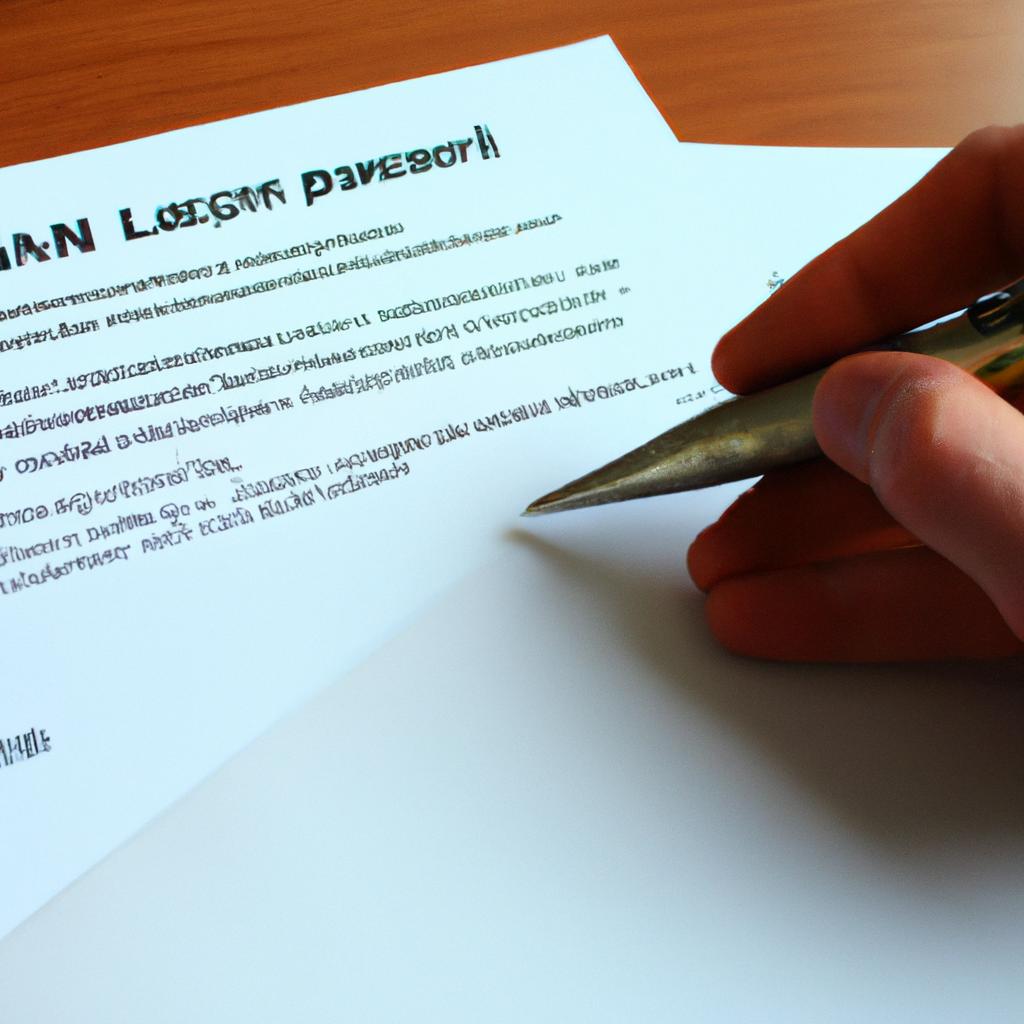Payday loans have become a prevalent form of short-term borrowing, particularly among low-income individuals and families. These loans provide quick access to cash, but often come with high interest rates and fees that can trap borrowers in a cycle of debt. In recent years, the issue of payday loans has garnered considerable attention within social sciences organizations as they seek to understand the impact of these financial products on vulnerable populations.
For instance, consider the hypothetical case study of Maria, a single mother struggling to make ends meet. Facing an unexpected medical emergency for her child, she turns to a payday loan to cover the expenses. While this immediate solution provides temporary relief, Maria soon finds herself unable to repay the loan due to exorbitant interest rates. As a result, she is forced to renew or roll over the loan multiple times, accumulating additional fees and plunging further into debt. This scenario highlights the complex nature of payday loans and underscores the need for increased financial literacy within society.
Academic research in social sciences organizations aims not only to explore the consequences of payday loans but also shed light on strategies that enhance financial literacy among vulnerable communities. By understanding how individuals perceive and utilize these loans, researchers can develop effective interventions aimed at promoting informed decision-making regarding personal finances. Additionally, academic research in social sciences organizations can also examine the role of government regulations and policies in addressing the issue of payday loans. By analyzing the effectiveness of existing regulations, researchers can provide insights on potential improvements to protect consumers from predatory lending practices.
Furthermore, academic research can explore alternative financial products or interventions that offer more affordable borrowing options for low-income individuals. This could include examining community-based lending programs, microfinance initiatives, or other innovative approaches that provide access to credit without trapping borrowers in a cycle of debt.
Overall, through rigorous academic research and analysis, social sciences organizations can contribute valuable knowledge and evidence-based recommendations to address the challenges posed by payday loans and promote financial well-being for vulnerable populations.
The impact of payday loans on individuals’ financial well-being
Payday loans have become a prevalent source of short-term financing, particularly among individuals with limited access to traditional banking services. These loans are marketed as a quick solution for unexpected expenses or emergencies, but their high interest rates and fees often lead borrowers into a cycle of debt. To illustrate the potential consequences, consider the case of Sarah, a single mother who found herself in need of immediate funds after her car broke down. Desperate to cover the repair costs and lacking other options, Sarah turned to a payday loan.
One aspect that amplifies the detrimental effect of payday loans is their disproportionately high interest rates. A typical payday loan may carry an annual percentage rate (APR) ranging from 300% to 500%, making it extremely difficult for borrowers like Sarah to repay the loan within the agreed-upon timeframe. As a result, borrowers often find themselves taking out additional loans to service existing debt obligations, leading to a vicious cycle of borrowing and repayment struggles.
Furthermore, the aggressive marketing tactics employed by payday lenders can exacerbate these challenges. Many lenders target vulnerable populations through advertising campaigns that emphasize convenience and accessibility while downplaying the potential risks associated with such loans. This predatory behavior preys upon those already facing financial difficulties, trapping them in a never-ending loop of indebtedness.
- Overwhelming stress caused by mounting debt
- Constant fear and anxiety about meeting payment deadlines
- Strained relationships due to financial strain
- Loss of confidence and self-esteem resulting from inability to manage finances effectively
In addition, let us present this table highlighting some alarming statistics related to payday loan dependence:
| Number | |
|---|---|
| Total U.S. Debt | $1.7 trillion |
| Payday Loan Debt | $9 billion |
| Average APR | 391% |
| Borrowers Trapped in Debt Cycle | 4 out of 5 |
In light of these alarming figures, it is crucial to consider the role of financial literacy in preventing payday loan dependence. By equipping individuals with essential knowledge and skills related to personal finance management, they can develop strategies for avoiding or minimizing their reliance on high-interest loans.
Continuing into the subsequent section about “The role of financial literacy in preventing payday loan dependence,” we delve deeper into how understanding basic financial concepts can empower individuals to make informed decisions regarding their economic well-being.
The role of financial literacy in preventing payday loan dependence
The impact of payday loans on individuals’ financial well-being cannot be overstated. To illustrate this, let’s consider a hypothetical example: Sarah, a single mother struggling to make ends meet, finds herself in need of immediate funds for her child’s medical expenses. With limited options available and an urgent need for cash, she turns to a payday loan provider.
Payday loans are often marketed as quick and easy solutions to short-term financial problems. However, the consequences can be far-reaching. Here are some key factors that contribute to the negative impact of payday loans:
-
High interest rates: Payday loans typically come with exorbitant interest rates, sometimes reaching triple-digit percentages. This means that borrowers like Sarah end up paying back significantly more than they initially borrowed, exacerbating their already precarious financial situation.
-
Debt trap cycle: Due to the short repayment period (usually two weeks), many borrowers find themselves unable to repay the loan in full when it is due. As a result, they often resort to renewing or rolling over the loan, leading to additional fees and charges. This creates a vicious cycle where individuals become trapped in long-term debt.
-
Emotional stress: The burden of excessive debt and constant financial pressure takes a toll on individuals’ mental health and overall well-being. The emotional strain caused by the inability to escape from this cycle only adds further distress.
-
Negative credit impact: Defaulting on payday loans can have severe consequences for one’s credit score. This makes it harder for individuals like Sarah to access other forms of credit or secure favorable terms for future borrowing needs.
To emphasize these points further, here is a bullet point list highlighting the emotional tolls associated with payday loan dependence:
- Anxiety and stress related to mounting debt
- Feelings of shame and embarrassment about being caught in a cycle of borrowing
- Strained relationships with family and friends due to financial instability
- Sense of hopelessness and powerlessness in breaking free from the debt trap
Additionally, let’s incorporate a table that presents some statistics related to payday loan usage:
| Statistics | Percentage |
|---|---|
| Borrowers experiencing | |
| difficulty repaying loans: | 75% |
| Loans renewed or rolled | |
| over at least once: | 80% |
| Average annual interest | |
| rate on payday loans: | 400% |
In conclusion, the impact of payday loans on individuals’ financial well-being is significant. The high interest rates, debt cycle, emotional stress, and negative credit consequences all contribute to worsening financial stability. It is crucial for society to recognize these issues and explore effective strategies to mitigate the detrimental effects of payday loan dependence.
Transitioning into the subsequent section about “Exploring the relationship between socioeconomic status and payday loan usage,” we delve further into understanding how different socio-economic factors can influence an individual’s propensity to rely on these types of loans.
Exploring the relationship between socioeconomic status and payday loan usage
Having examined the role of financial literacy in preventing payday loan dependence, we now turn our attention to exploring the relationship between socioeconomic status and payday loan usage. To illustrate this connection, let us consider a hypothetical case study involving two individuals – Jane and Sarah.
Paragraph 1:
Jane, a single mother struggling to make ends meet on a limited income, finds herself trapped in a cycle of payday loans. With mounting debts and high interest rates, she constantly feels overwhelmed by her financial situation. This example highlights the detrimental effects that payday loan dependence can have on an individual’s overall well-being.
To further understand these harmful consequences, it is crucial to recognize several key factors related to payday loan usage:
- Limited access to traditional banking services
- Lack of alternative credit options
- Financial stressors leading to mental health issues
- Inter-generational impacts affecting children’s future prospects
Bullet point list (markdown format):
The ramifications of payday loan dependence are far-reaching and include:
- Increased levels of anxiety and depression
- Difficulty meeting basic needs such as housing and food security
- Negative impact on credit scores hindering future financial opportunities
- Potential for intergenerational poverty due to reduced resources available for children’s education and development
Table (markdown format):
| Impact | Description |
|---|---|
| Emotional distress | Anxiety, depression, and emotional strain caused by the constant burden of debt |
| Material deprivation | Inability to afford essential necessities like housing or nutritious meals |
| Long-term financial hurdles | Damaged credit scores limiting access to affordable loans or mortgage options |
| Intergenerational implications | Reduced resources for children’s education and potential perpetuation of poverty across generations |
Paragraph 2:
These findings emphasize the urgent need for interventions aimed at promoting greater financial literacy and reducing payday loan dependence, particularly among individuals from marginalized communities. By addressing the underlying factors contributing to this issue, we can pave the way for improved economic well-being and social mobility.
With a clear understanding of the impacts of payday loan dependence on individual well-being, we now turn our attention to effective strategies for promoting financial literacy in marginalized communities. It is essential to consider comprehensive approaches that address both immediate needs and long-term solutions without further perpetuating cycles of debt.
Effective strategies for promoting financial literacy in marginalized communities
Exploring the Relationship Between Socioeconomic Status and Payday Loan Usage
The relationship between socioeconomic status (SES) and payday loan usage is a topic of great interest in social sciences organizations. By examining this connection, researchers hope to gain insights into how different socio-economic factors influence individuals’ decisions to utilize payday loans. To illustrate this relationship, let’s consider a hypothetical case study.
Imagine two individuals: John, who belongs to a low SES group, and Sarah, who comes from a higher SES background. Both face unexpected financial emergencies that require immediate funds. Due to their differing economic circumstances, they have distinct options available to them. John may be more likely to turn to payday loans as he lacks access to traditional banking services or alternative sources of credit. In contrast, Sarah might have savings or other resources readily accessible without resorting to borrowing money at high-interest rates.
To better understand the dynamics at play in the relationship between SES and payday loan usage, several key factors should be considered:
-
Income Disparity:
- Low-income individuals often find it challenging to cover unexpected expenses.
- Limited income can lead people towards seeking short-term financial solutions like payday loans.
-
Education Level:
- Individuals with lower levels of education may not possess adequate financial literacy skills.
- Lack of knowledge about budgeting or alternative financial resources may make payday loans seem like the only viable option.
-
Access to Traditional Banking Services:
- Marginalized communities may experience limited access to mainstream banks due to various reasons such as geographical location or discriminatory practices.
- This lack of accessibility can push individuals towards utilizing payday loan services instead.
-
Social Support Networks:
- Strong support networks have been shown to mitigate financial hardships by providing assistance during emergencies.
- Individuals lacking such networks may feel compelled to rely on payday loans for urgent monetary needs.
To further comprehend these connections between SES and payday loan usage, we can analyze the information in a table format:
| Factors | Low SES Individuals | Higher SES Individuals |
|---|---|---|
| Income Disparity | Struggle to cover unexpected expenses | Have resources to handle emergencies |
| Education Level | Limited financial literacy skills | Possess greater financial knowledge |
| Access to Banking | Lack access due to various reasons | Enjoy more accessible banking options |
| Social Support | May lack strong support networks | Benefit from supportive relationships |
Understanding these factors is crucial for designing effective strategies that promote financial literacy and reduce reliance on payday loans among marginalized communities. By addressing the underlying causes of payday loan usage, social sciences organizations can contribute towards fostering economic empowerment and resilience within these communities.
Transitioning into the subsequent section about “Analyzing the Ethical Considerations of Payday Loan Lenders,” we uncover further aspects surrounding this complex issue.
Analyzing the ethical considerations of payday loan lenders
Effective strategies for promoting financial literacy in marginalized communities play a crucial role in mitigating the negative impact of payday loans. By empowering individuals with knowledge and skills to make informed financial decisions, social sciences organizations can help break the cycle of debt and improve overall economic well-being. For instance, let us consider the hypothetical case study of Maria, a single mother living paycheck to paycheck.
To effectively promote financial literacy among marginalized communities like Maria’s, several key strategies have proven successful:
-
Community-based workshops: Conducting interactive workshops within local neighborhoods allows for direct engagement with community members. These workshops could cover topics such as budgeting, saving, credit management, and understanding loan terms. By tailoring these sessions to address specific concerns faced by marginalized groups, participants are more likely to connect with the material and apply it to their own circumstances.
-
Partnerships with grassroots organizations: Collaborating with established community organizations that already have trust and rapport within marginalized communities is vital. Through partnerships, social sciences organizations can leverage existing networks to reach larger audiences and ensure that educational initiatives align with community needs and cultural sensitivities.
-
Online resources: Providing accessible online resources such as informative websites or mobile applications can help overcome barriers related to time constraints or physical accessibility. This digital approach enables individuals like Maria to access materials at their convenience while offering support through forums or virtual assistance services.
-
Financial coaching programs: Implementing one-on-one financial coaching programs can help bridge the gap between education and practical application by providing personalized guidance tailored to individual circumstances. Coaches can assist clients in setting realistic goals, developing budgets, managing debts, and making sound financial decisions.
In addition to these strategies, an emotional connection can be fostered by highlighting real-life stories of success from individuals who have successfully navigated out of difficult financial situations using these tools and techniques.
| Emotional Impact |
|---|
| Empowerment |
| Hope |
| Resilience |
| Confidence |
By showcasing the emotional impact of these strategies, social sciences organizations can inspire marginalized individuals to take control of their financial well-being and break free from the cycle of payday loans.
Moving forward, it is essential to explore the ethical considerations associated with payday loan lenders. Understanding the potential implications for vulnerable populations will inform policies aimed at protecting consumers and promoting fair lending practices within social sciences organizations.
The potential policy implications of payday loans in social sciences organizations
Analyzing the ethical considerations of payday loan lenders highlighted the potential harm and exploitation that can occur within this industry. Building upon these ethical concerns, it is crucial to examine the policy implications of payday loans in social sciences organizations. By exploring how such loans intersect with financial literacy initiatives, we can better understand their impact on vulnerable populations.
One example illustrating the need for robust policies around payday loans involves a hypothetical case study involving a community organization focused on providing resources for low-income individuals. This organization offers financial literacy workshops as part of its mission to empower individuals with knowledge about personal finance management. However, without addressing the issue of predatory lending practices, their efforts may be undermined by the negative consequences associated with payday loans.
To comprehend the potential policy implications of payday loans in social sciences organizations, several key factors should be considered:
- Accessibility: Payday loan access must be examined from an equity standpoint, considering whether certain communities are disproportionately targeted or lack viable alternatives.
- Education: Financial literacy programs should incorporate information specifically related to payday loan borrowing and its consequences.
- Regulation: Policies should address interest rate caps, repayment terms, and disclosure requirements to ensure fair lending practices.
- Collaboration: Social sciences organizations could collaborate with advocacy groups and policymakers to advocate for comprehensive reform regarding payday loans.
The emotional toll experienced by individuals caught in cycles of debt due to high-interest payday loans cannot be understated. To highlight this aspect further, consider the following table:
| Emotional Impact | Description |
|---|---|
| Stress | Constant worry over meeting repayment deadlines and accumulating interest rates |
| Shame | Feelings of embarrassment and self-blame surrounding taking out a payday loan |
| Desperation | A sense of hopelessness when faced with limited options for immediate cash needs |
| Vulnerability | Increased susceptibility to exploitative practices due to financial instability |
In conclusion, examining the policy implications of payday loans within social sciences organizations is essential for understanding their potential impact on vulnerable populations. By developing comprehensive policies that address accessibility, education, regulation, and collaboration, these organizations can strive towards promoting financial literacy while safeguarding individuals from the negative consequences associated with payday loans. It is crucial to recognize the emotional toll experienced by those affected and work towards creating a more equitable and sustainable financial system.




